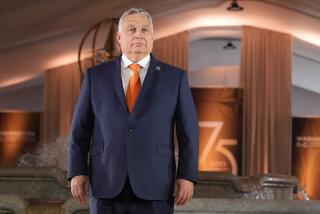Israelis Punish Palestinians’ Diplomacy in Jerusalem
- Share via
JERUSALEM — Palestinians like to think of Orient House, a gated building on the east side of Jerusalem, as a de facto foreign ministry where they can meet with visiting dignitaries.
Israeli Prime Minister Benjamin Netanyahu likes to say he has put a stop to such contacts, noting that they violate peace agreements and undermine Israel’s claimed sovereignty over the city.
Despite Israel’s insistence that Orient House not be used for diplomatic activity, several prominent Palestinian leaders held a meeting there this week with about 20 mostly European consuls and quite a few journalists.
And at the same time that it pooh-poohed the meeting as “meaningless,” Netanyahu’s government meted out swift punishment by yanking travel privileges from three of the meeting’s Palestinian hosts, including well-known legislator and human rights advocate Hanan Mikhail-Ashrawi.
Further actions deemed provocative by Israel will be met “with full force,” a government statement said Friday.
Thus the festering, emotional battle for Jerusalem escalated again, pitting the government against most of Europe in a conflict made all the more raw by Israel’s highly charged election season.
To be sure, the future status of this disputed city is perhaps the single most complicated, deadlocked issue yet to be resolved in peace negotiations between Israel and the Palestinians.
Yet many in Israel consider this latest stink as much a function of elections two months from now as anything else. Few Israelis, and none of the major candidates opposing Netanyahu, disagree on Jerusalem as Israel’s capital, and none of the opinions voiced by the Palestinians or Europeans that are so angering the government are new. Critics note that Netanyahu narrowly won election in 1996 in part by raising the Jerusalem issue and creating a perception that he was the candidate who could best protect Israel’s claim to the Holy City.
Netanyahu’s hard-line foreign minister, Ariel Sharon, entered the fray Friday in an emotional op-ed piece in the Jerusalem Post. A former army general, Sharon wrote that he found it hard to believe that 50 years after the bloody battles to “liberate” Jerusalem, “we still have to fight for Jerusalem, to repel ongoing attacks seeking to undermine our right to this city.”
While Israel insists that under no circumstance will it relinquish its ancient claim to Jerusalem, the Palestinians demand that the eastern part of the city, which Israel captured from Jordan in the 1967 Six-Day War, be their capital in an eventual Palestinian state.
Washington may add fuel to the fire in upcoming days. The Clinton administration is considering whether to heed a 1995 U.S. law requiring that the U.S. Embassy move from Tel Aviv to Jerusalem.
President Clinton must decide by the end of May, and U.S. sources said Friday that it is all but certain Clinton will again waive the law and leave the embassy in Tel Aviv.
Such an announcement would please the Palestinians but anger the Israeli government because it would reconfirm American refusal to recognize Jerusalem as the capital of Israel, a position shared by most of the international community.
The U.S. position is that Jerusalem should remain united but that its fate should be determined in so-called final status talks meant to culminate the peace process started by the landmark Oslo accords in 1993. All negotiations are on hold, however, pending Israel’s May 17 election.
Instead of negotiations, the Israeli government succeeded in reigniting the Jerusalem issue by focusing on Orient House.
The Foreign Ministry last month reiterated to the European Union its insistence that Orient House not be used for senior-level diplomatic contacts. The EU refused and reiterated its view of Jerusalem as a “corpus separatum”--an entity separate from Israel as defined by a 1947 U.N. resolution.
Netanyahu and other officials took great umbrage.
Sharon assembled the diplomatic corps in what he called “Jerusalem, the capital of the Jewish people for the last 3,000 years and the capital of Israel for the last 50 years,” and declared the “corpus separatum” resolution to be “null and void.”
Then came the meeting Thursday, when the Palestinians invited middle-level diplomats to Orient House in what most described as a routine session.
Initially, the government also saw it as routine and “insignificant.” Then Netanyahu and Sharon decided to punish Mikhail-Ashrawi, Faisal Husseini and Ziad abu Ziad by taking away special permits they have that ease their passage through Israeli army checkpoints when they enter Israel from Palestinian-controlled territories.
Netanyahu’s opponents accused him of setting up a straw man for electoral gain, a charge he denied.
More to Read
Sign up for Essential California
The most important California stories and recommendations in your inbox every morning.
You may occasionally receive promotional content from the Los Angeles Times.














